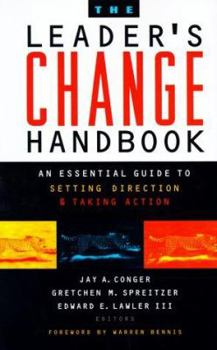The Leader's Change Handbook: An Essential Guide to Setting Direction and Taking Action
Select Format
Select Condition 
Book Overview
A Stunning Achievement in Change ManagementIn October of 1997, the nation's top business theorists and practitioners met at a conference cosponsored by USC's Leadership Institute and the Center for Effective Organizations. The group was challenged to present their most advanced ideas regarding leadership and change management. This guide is the stunning result of their collective efforts. Charged with fascinating case studies, action strategies, and...
Format:Hardcover
Language:English
ISBN:0787943517
ISBN13:9780787943516
Release Date:November 1998
Publisher:Jossey-Bass
Length:432 Pages
Weight:1.64 lbs.
Dimensions:1.3" x 6.3" x 9.3"
Customer Reviews
2 ratings
Thirteen Assumptions of Advanced Change Theory
Published by Thriftbooks.com User , 23 years ago
This book is a remarkable guide from 20 remarkable thought leaders for leaders of the new century. Jay A.Conger, Gretchen M.Spreitzer, and Edward E.Lawler III divide this invaluable volume into four parts. As written by them, Part Three-Chapter Seven, by Robert E.Quinn and Nancy T.Snyder, introduces Advanced Change Theory (ACT), arguing that the leaders must change him- or herself first to ensure that his or her deed and actions are consistent with the vision of the future before expecting others to change. In this context, R.E.Quinn and N.T.Snyder identify thirteen assumptions/principles of ACT as following:1. Assumptions of relationship: alignment with changing reality requires relationships of inclusion, openness, and emergent community.2. Assumptions of purpose: to establish an emergent community, a change agent must put the pursuit of the common good ahead of self interest.3. Assumptions of resistance: to maintain alignment with changing reality and with the common good, a change agent focuses on internal sources of resistance, continually seeking to reduce self-deception and personal hypocrisy.4. Assumptions of influence: in influencing others, the change agent first models the courage and discipline of self modification, the resulting integrity then serves to influence others by attracting them into a relationship, or community, of mutual support and exploration.5. Assumptions of empowerment: by transcending self-deception and personal hypocrisy, the change agent empowers and frees the self from the controlling sanctions within the existing social system.6. Assumptions of enlightenment: in freeing self from external sanctions through personal modification, the change agent obtains increased understanding, enlightenment, or vision about direction and strategy.7. Assumptions of volition: the change agent's increased understanding and personal empowerment result in increased reverence for the potential and the volition of the change target.8. Assumptions of motivation: given the high respect for the volition of the change target, the change agent seeks to inspire growth by attracting the change target to engage in noble tasks of service for the higher good of the community.9. Assumptions of causality: the change agent recognizes the change target's need for relationship and assumes that change happens as a nonlinear process of mutuality and cocreation that further requires continued integrity and increasing trust.10. Asumptions of strategic vision: the change agent's efforts in self-modification and empowerment result in increased cognitive complexity and the ability to see larger governing rules or seemingly paradoxical relationships.11. Assumptions of behavior: freed from the influence of the existing sanction system, and holding a more complex or paradoxical world view, the change agent engages in unconventional behaviors that distort routines, capture attention, and move the system toward the edge of chaos.12. Assumptions of determination
Enlightening, engaging essays on organizational change.
Published by Thriftbooks.com User , 25 years ago
Leadership and change seem inexorably linked, although in this collection of papers some writers challenge even this conventional wisdom. This is an enlightening gathering of contributions by leading authorities. It is based on the findings and conclusion of executives and consultants and conveys observations and lessons from the experiences of such companies as Whirlpool, GE, Shell, and Lucent. There are lots of nuggets, small and large, in these pages, for instance: a highlighting of the seven primary errors and eight steps to transforming an organization; an explanation of four basic change strategies including Advanced Change Theory, a new approach that accounts for the work of such change agents as Gandhi and King; definitions of seven organizational design elements; and a checklist for transformational leaders. Overall, there is a wealth of thoughtfulness making up this collection of enlightening and engaging essays, capped-off by a helpful summary chapter that captures the books take-away lessons. Reviewed with much interest by Gerry Stern, author of Stern's SourceFinder Master Directory to HR and Business Management Information and Resources.





